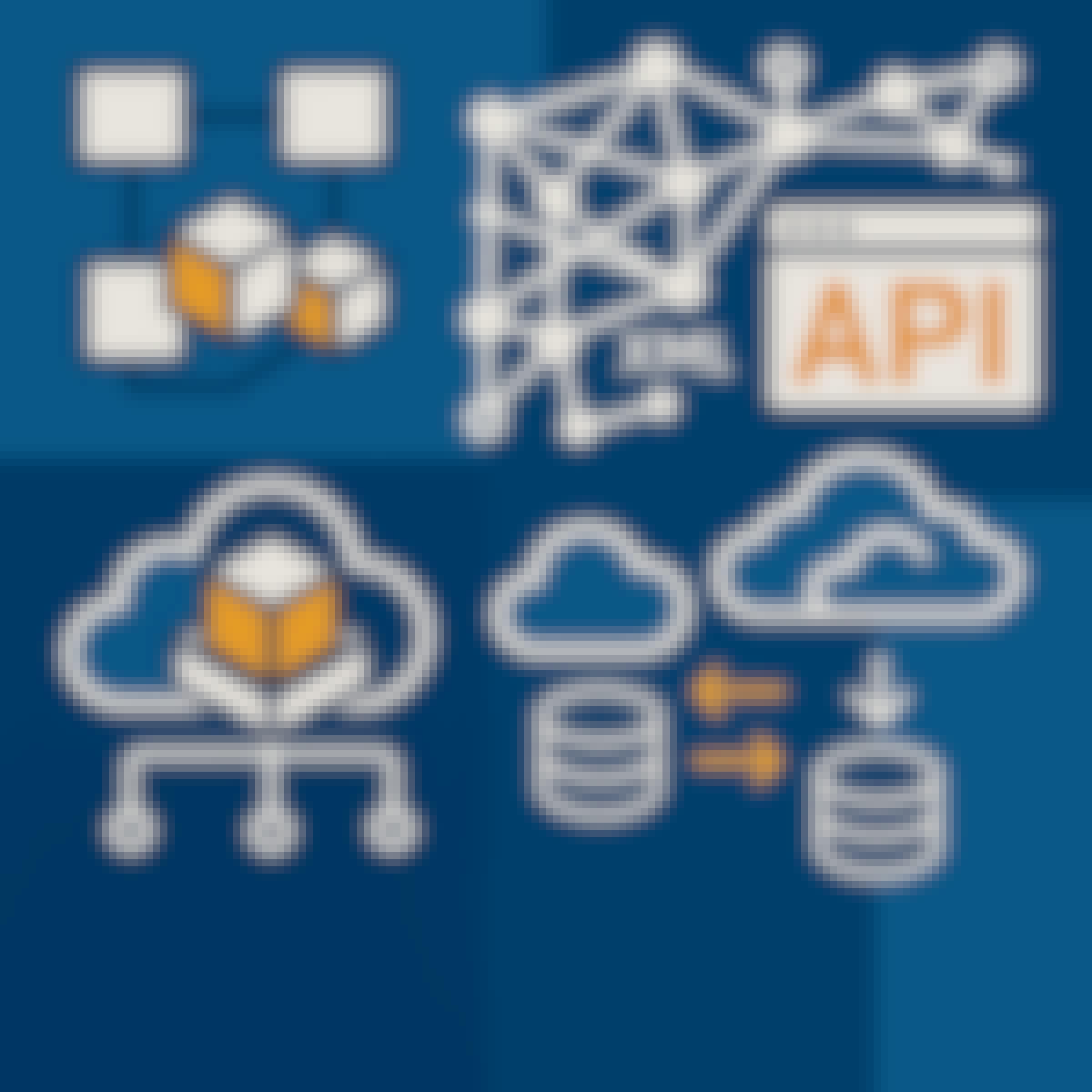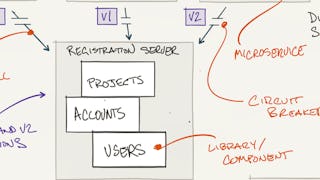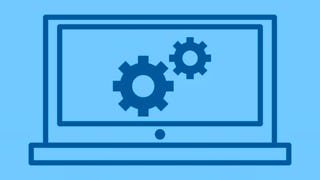- Browse
- Distributed Systems
Results for "distributed systems"
 Status: NewNewStatus: Free TrialFree TrialU
Status: NewNewStatus: Free TrialFree TrialUUniversity of Pittsburgh
Skills you'll gain: Web Services, Cloud Computing, Cloud Computing Architecture, Cloud Storage, Cloud Infrastructure, Cloud Applications, Google Cloud Platform, Flask (Web Framework), Distributed Computing, Containerization, Software Architecture, Docker (Software), Virtualization, Restful API, JSON, Microservices, Scalability, Extensible Markup Language (XML), API Design, Computer Architecture
Build toward a degree
Intermediate · Course · 1 - 3 Months
 Status: Free TrialFree TrialR
Status: Free TrialFree TrialRRice University
Skills you'll gain: Apache Kafka, Apache Spark, Apache Hadoop, Distributed Computing, Dataflow, Java Programming, Java, Software Architecture, Systems Architecture, Scala Programming, Data Structures, System Programming, Programming Principles, Servers, Application Frameworks, Debugging, Algorithms, Performance Tuning, Functional Design, Performance Testing
4.6·Rating, 4.6 out of 5 stars1.6K reviewsIntermediate · Specialization · 3 - 6 Months
 Status: Free TrialFree TrialU
Status: Free TrialFree TrialUUniversity of Colorado Boulder
Skills you'll gain: Real-Time Operating Systems, Systems Architecture, Embedded Software, Software Design, System Design and Implementation, Embedded Systems, System Programming, Software Systems, Electronic Systems, Systems Design, Hardware Architecture, Software Architecture, Requirements Analysis, Real Time Data, Linux, Service Level, OS Process Management, System Requirements, Debugging, Algorithms
Build toward a degree
4·Rating, 4 out of 5 stars122 reviewsIntermediate · Specialization · 3 - 6 Months
 Status: Free TrialFree TrialU
Status: Free TrialFree TrialUUniversity of Colorado Boulder
Skills you'll gain: Service Level, Database Management, Acceptance Testing, Software Engineering, Web Applications, Performance Testing, Scalability, Microservices, Software Architecture, Data Architecture, Distributed Computing, Data Infrastructure, System Monitoring, Functional Requirement, Application Deployment, User Acceptance Testing (UAT), Application Development, Prototyping, Predictive Modeling, Big Data
Build toward a degree
3.5·Rating, 3.5 out of 5 stars105 reviewsAdvanced · Specialization · 1 - 3 Months
 Status: Free TrialFree Trial
Status: Free TrialFree TrialSkills you'll gain: File Systems, Operating Systems, OS Process Management, C (Programming Language), System Programming, Unix, Virtualization, Data Integrity, Debugging, File I/O, Linux, Performance Tuning, Distributed Computing, Data Storage, Command-Line Interface, Virtual Machines, Data Security, Computer Hardware, Scalability, Data Structures
4.6·Rating, 4.6 out of 5 stars315 reviewsBeginner · Specialization · 3 - 6 Months
 Status: Free TrialFree TrialU
Status: Free TrialFree TrialUUniversity of Colorado Boulder
Skills you'll gain: Model Based Systems Engineering, Failure Analysis, Systems Engineering, Engineering Management, Requirements Management, Scope Management, Design Reviews, Project Scoping, Root Cause Analysis, Program Management, Requirements Analysis, User Requirements Documents, Test Engineering, Cost Management, Contract Management, Systems Design, Business Requirements, Systems Thinking, Project Risk Management, Risk Management
Build toward a degree
4.8·Rating, 4.8 out of 5 stars153 reviewsBeginner · Specialization · 3 - 6 Months
What brings you to Coursera today?
 Status: Free TrialFree TrialStatus: AI skillsAI skillsG
Status: Free TrialFree TrialStatus: AI skillsAI skillsGGoogle
Skills you'll gain: Threat Modeling, Network Security, Threat Management, Vulnerability Management, Intrusion Detection and Prevention, Hardening, Computer Security Incident Management, Security Management, Cyber Threat Intelligence, Cyber Attacks, Incident Response, Cybersecurity, Network Protocols, Threat Detection, Bash (Scripting Language), Debugging, Linux, Interviewing Skills, Python Programming, SQL
Build toward a degree
4.8·Rating, 4.8 out of 5 stars64K reviewsBeginner · Professional Certificate · 3 - 6 Months
 Status: Free TrialFree TrialU
Status: Free TrialFree TrialUUniversity of Illinois Urbana-Champaign
Skills you'll gain: Distributed Computing, NoSQL, Apache Cassandra, Cloud Computing, Systems Design, Data Storage Technologies, Apache Hadoop, Database Theory, Algorithms, Theoretical Computer Science, Scalability, C++ (Programming Language), Network Protocols
4.3·Rating, 4.3 out of 5 stars1.1K reviewsBeginner · Course · 1 - 3 Months
 Status: Free TrialFree TrialStatus: AI skillsAI skillsG
Status: Free TrialFree TrialStatus: AI skillsAI skillsGGoogle
Skills you'll gain: Quality Management, Project Closure, Scope Management, Team Management, Sprint Retrospectives, Project Management, Project Planning, Agile Project Management, Quality Assurance, Backlogs, Team Leadership, Project Scoping, Project Management Life Cycle, Stakeholder Analysis, Project Controls, Project Risk Management, Project Implementation, Change Management, Interviewing Skills, Applicant Tracking Systems
Build toward a degree
4.8·Rating, 4.8 out of 5 stars141K reviewsBeginner · Professional Certificate · 3 - 6 Months

Skills you'll gain: Distributed Computing, Java, Middleware, NoSQL, Event-Driven Programming, Databases, Software Architecture, Servers, Web Services, Microservices, Scalability, Transaction Processing
Intermediate · Course · 1 - 3 Months
 Status: Free TrialFree TrialU
Status: Free TrialFree TrialUUniversity of Colorado Boulder
Skills you'll gain: OSI Models, Network Security, TCP/IP, Cloud Computing, Cloud Infrastructure, Software-Defined Networking, Network Architecture, Virtual Networking, Wide Area Networks, Network Protocols, General Networking, Network Routing, Network Routers, Network Troubleshooting, Linux, Virtualization, Kubernetes, Computer Networking, Network Switches, Terraform
Build toward a degree
4.6·Rating, 4.6 out of 5 stars108 reviewsIntermediate · Specialization · 3 - 6 Months
 Status: Free TrialFree TrialT
Status: Free TrialFree TrialTThe Linux Foundation
Skills you'll gain: Package and Software Management, Open Source Technology, Git (Version Control System), Linux, Command-Line Interface, Bash (Scripting Language), File Systems, Unix Commands, GitHub, Linux Administration, Version Control, Linux Commands, User Accounts, CI/CD, Shell Script, System Configuration, Collaborative Software, Scripting, Software Development Tools, Software Versioning
4.6·Rating, 4.6 out of 5 stars3.1K reviewsBeginner · Specialization · 3 - 6 Months
What brings you to Coursera today?
In summary, here are 10 of our most popular distributed systems courses
- Distributed Systems and Web Services: University of Pittsburgh
- Parallel, Concurrent, and Distributed Programming in Java: Rice University
- Real-Time Embedded Systems: University of Colorado Boulder
- Software Architecture for Big Data: University of Colorado Boulder
- Introduction to Operating Systems: Codio
- Introduction to Systems Engineering: University of Colorado Boulder
- Google Cybersecurity: Google
- Cloud Computing Concepts, Part 1: University of Illinois Urbana-Champaign
- Google Project Management: Google
- Building Modern Distributed Systems with Java: Packt
Frequently Asked Questions about Distributed Systems
A variety of job opportunities exist in the field of distributed systems. Positions such as distributed systems engineer, cloud architect, software developer, and systems analyst are common. These roles often require a strong understanding of how to design, implement, and manage distributed applications. Additionally, industries like finance, healthcare, and technology are actively seeking professionals who can ensure the reliability and efficiency of their distributed systems.
To effectively learn about distributed systems, you should focus on several key skills. These include knowledge of networking concepts, familiarity with cloud computing platforms, proficiency in programming languages such as Java or Python, and an understanding of database management. Additionally, skills in system design, debugging, and performance optimization are valuable. Gaining experience with tools and frameworks used in distributed systems, such as Apache Kafka or Kubernetes, can also enhance your expertise.
There are numerous online courses available for those interested in distributed systems. Some notable options include Foundations of Distributed Database Systems and Building Modern Distributed Systems with Java. These courses provide foundational knowledge and practical skills that can help you understand the complexities of distributed architectures.
Yes. You can start learning distributed systems on Coursera for free in two ways:
- Preview the first module of many distributed systems courses at no cost. This includes video lessons, readings, graded assignments, and Coursera Coach (where available).
- Start a 7-day free trial for Specializations or Coursera Plus. This gives you full access to all course content across eligible programs within the timeframe of your trial.
If you want to keep learning, earn a certificate in distributed systems, or unlock full course access after the preview or trial, you can upgrade or apply for financial aid.
To learn distributed systems effectively, start by exploring foundational concepts through online courses or textbooks. Engage in hands-on projects to apply what you've learned, and consider contributing to open-source projects related to distributed systems. Joining online communities or forums can also provide support and additional resources as you navigate your learning path.
Typical topics covered in distributed systems courses include system architecture, communication protocols, data consistency, fault tolerance, and scalability. You may also explore specific technologies and frameworks used in distributed systems, such as microservices, cloud computing, and container orchestration. Understanding these concepts will equip you with the knowledge needed to design and implement effective distributed solutions.
For training and upskilling employees in distributed systems, consider courses like IBM Systems Analyst Professional Certificate and Parallel, Concurrent, and Distributed Programming in Java Specialization. These programs are designed to provide comprehensive training that can enhance the skills of your workforce, ensuring they are well-equipped to handle the demands of modern distributed systems.










